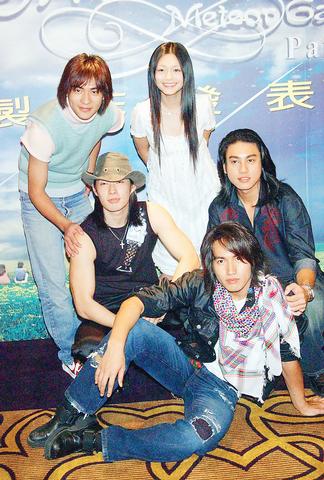Chinese officials denied Tuesday that Taiwanese boy band F4 had been banned from the country, despite the last-minute cancellation of two concerts amid accusations the pop group amounted to "electronic heroin" for impressionable teenage girls.
Official concern has mounted after the baby-faced foursome prompted scenes of screaming and fainting among thousands of girls during appearances in China.
A planned concert at a central Shanghai shopping mall this weekend was called off after 10,000 fans went wild and blocked exits, causing fears of a crush.

TAIPEI TIMES FILE PHOTO
"We originally expected around 1,000 people would attend the event since it was organized merely to thank our clients, computer distributors and some media, but more than 10,000 people mobbed the venue," said a spokeswoman for Legend Computer Group, one of the concert's sponsors.
F4 had been due to play a concert at Shanghai's Hongkou Football Stadium on Sunday to spur on China's players ahead of the World Cup, but that too was called off.
Fans expressed worry that the sudden cancellation, which followed the banning of a television series which shot the foursome to fame, could mean their heroes were no longer welcome in China.
But an official at the Ministry of Culture denied this.
"We had already approved the May 19 concert in Shanghai, but it was cancelled later due to other reasons," she said.
An official from the China Football Association in Shanghai said the problem had simply been a lack of notice.
"We did not have enough time to make full preparation for security and other technical problems, so we cancelled the concert.," said Wu Weiming.
Officials, however, remain unhappy with Meteor Garden, the 18-part television series which made the group famous.
Parents called the show -- which shows the foursome chasing girls, singing songs and skiving school -- "electronic heroin" and criticized it for setting a poor example to students preparing for exams. It was banned after only six episodes.
An official at the State Administration of Broadcasting and Television said the plug had been pulled on March 8 "because the content of the drama was unhealthy for the development of youth."
Ma Yue of the Shanghai Evening Post, who has chronicled the boy band's meteoric rise to fame, said it was unsurprising authorities barred the series.
"The drama contains a lot of elements which are contradictory to Chinese traditional culture. Of the four beaus in the drama, one kept changing his girlfriend, one had very bad temper and was violent and the four organized a hooligan gang and bullied other students," he said.
But Ma conceded that the four popsters, who play boys from rich Taiwanese families, embodied teenage fantasies of the ideal mate.
"Unlike other pop bands whose members have similar characters and outlooks, the four boys all have distinctive characters. One is very masculine while another is quite gentle and shy, so they can cater for the various requirements young girls hope their Prince Charming will have," he explained.
Fans say the drama was compelling viewing and have rushed out to buy pirated copies of the rest of the series.
"Once you had started watching you had to see what happened," said 22-year-old Flora Xie, much older than the bulk of F4's fans, although the group has built up a sizable following among a cross-section of society, even women in their 40s and 50s.
And in modern-day China, an official ban is often considered the official seal of cool.

Costa Rica sent a group of intelligence officials to Taiwan for a short-term training program, the first time the Central American country has done so since the countries ended official diplomatic relations in 2007, a Costa Rican media outlet reported last week. Five officials from the Costa Rican Directorate of Intelligence and Security last month spent 23 days in Taipei undergoing a series of training sessions focused on national security, La Nacion reported on Friday, quoting unnamed sources. The Costa Rican government has not confirmed the report. The Chinese embassy in Costa Rica protested the news, saying in a statement issued the same

Taiwan’s Liu Ming-i, right, who also goes by the name Ray Liu, poses with a Chinese Taipei flag after winning the gold medal in the men’s physique 170cm competition at the International Fitness and Bodybuilding Federation Asian Championship in Ajman, United Arab Emirates, yesterday.

A year-long renovation of Taipei’s Bangka Park (艋舺公園) began yesterday, as city workers fenced off the site and cleared out belongings left by homeless residents who had been living there. Despite protests from displaced residents, a city official defended the government’s relocation efforts, saying transitional housing has been offered. The renovation of the park in Taipei’s Wanhua District (萬華), near Longshan Temple (龍山寺), began at 9am yesterday, as about 20 homeless people packed their belongings and left after being asked to move by city personnel. Among them was a 90-year-old woman surnamed Wang (王), who last week said that she had no plans

TO BE APPEALED: The environment ministry said coal reduction goals had to be reached within two months, which was against the principle of legitimate expectation The Taipei High Administrative Court on Thursday ruled in favor of the Taichung Environmental Protection Bureau in its administrative litigation against the Ministry of Environment for the rescission of a NT$18 million fine (US$609,570) imposed by the bureau on the Taichung Power Plant in 2019 for alleged excess coal power generation. The bureau in November 2019 revised what it said was a “slip of the pen” in the text of the operating permit granted to the plant — which is run by Taiwan Power Co (Taipower) — in October 2017. The permit originally read: “reduce coal use by 40 percent from Jan.